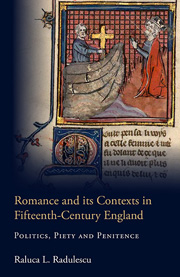Book contents
- Frontmatter
- Dedication
- Contents
- Acknowledgements
- Abbreviations
- Preface
- 1 Fifteenth-Century Contexts for the Reading of Middle English Romances
- 2 Spiritual Journeys through Political Realities: the ‘Pious’ Romances
- 3 Chronicling Britain's Christian Conversion: Henry Lovelich's History of the Holy Grail
- 4 The Politics of Salvation in Thomas Malory's Le Morte Darthur
- Afterword
- Appendix 1 Plot summaries
- Appendix 2 Genealogies
- Bibliography
- Index
3 - Chronicling Britain's Christian Conversion: Henry Lovelich's History of the Holy Grail
Published online by Cambridge University Press: 05 October 2013
- Frontmatter
- Dedication
- Contents
- Acknowledgements
- Abbreviations
- Preface
- 1 Fifteenth-Century Contexts for the Reading of Middle English Romances
- 2 Spiritual Journeys through Political Realities: the ‘Pious’ Romances
- 3 Chronicling Britain's Christian Conversion: Henry Lovelich's History of the Holy Grail
- 4 The Politics of Salvation in Thomas Malory's Le Morte Darthur
- Afterword
- Appendix 1 Plot summaries
- Appendix 2 Genealogies
- Bibliography
- Index
Summary
By the time Lovelich, a London skinner, completed his translations of the first two pillars of the Old French Vulgate Cycle, the Estoire del Saint Graal and Estoire de Merlin (henceforth the Graal and the Merlin), in the first half of the fifteenth century, manuscripts of the various parts of the cycle had been in circulation in England for two centuries. The Graal and the Merlin circulated together in sometimes heavily illuminated manuscripts, which may account for Lovelich's choice or at the very least the way in which his two translations were copied and presented in the unique surviving copy of his work, Cambridge, Corpus Christi College MS 80. The Graal focuses on the story of the conversion of Britain to Christianity through the agency of Joseph of Arimathea, his son Josephe and their followers; it also contains the adventures of the newly converted king of Sarras Evalac (Mordrain by his new name as a convert), his brother-in-law Seraphe (Nascien once baptised), Celidoine (Seraphe's son and Evalac's nephew) and his descendants up to King Launcelot, grandfather of Launcelot de Lac. As Emmanuèle Baumgartner has shown, the Graal contains a third translatio, of the knowledge of God's secrets vested in Joseph of Arimathea and symbolised by the Grail; this was most likely one of the factors contributing to its appeal to Lovelich and his commissioner.
- Type
- Chapter
- Information
- Romance and its Contexts in Fifteenth-Century EnglandPolitics, Piety and Penitence, pp. 87 - 148Publisher: Boydell & BrewerPrint publication year: 2013



